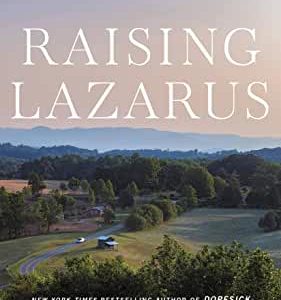How To Think About Those Experiencing Drug Addiction
I am working my way through Beth Macy’s newest book, Raising Lazarus: Hope, Justice and the Future of America’s Overdose Crisis. Macy is the author of the earlier, Dopesick, which was turned into a television series by Hulu.
 I was asked to review Raising Lazarus for a magazine I write for every now and then. I accepted the request for two reasons. I felt that 1) I needed to know more about the opioid crisis and 2) I needed to examine my own attitudes and prejudices. Like many in Seattle I have been dismayed by the proliferation of unauthorized tent encampments where drug use and abuse are common, and which create problems that spill over into the wider community.
I was asked to review Raising Lazarus for a magazine I write for every now and then. I accepted the request for two reasons. I felt that 1) I needed to know more about the opioid crisis and 2) I needed to examine my own attitudes and prejudices. Like many in Seattle I have been dismayed by the proliferation of unauthorized tent encampments where drug use and abuse are common, and which create problems that spill over into the wider community.
Macy’s book proceeds on two tracks. The first offers profiles of people she calls “Stone Rollers,” a colorful cast of characters who are doing the work of harm reduction among the addicted, often with little support, sometimes garnering hostility for their efforts. The Stone Rollers are Davids to the Goliath of Macy’s second track subject, Purdue Pharma, and its owners, the Sackler family. Purdue is the creator and pusher of OxyContin.
Macy makes no secret of her sympathies, writing, “Whether we realize it or not, most of us continue blaming the victims rather than the corporations, politicians and impotent regulators who allowed the wealthy to poison our nation.”
At the heart of the book, and the heart of American response to the opioid crisis, is one key question. Do we view drug addiction as a disease or a personal failing and/or crime? Macy clearly sees it as a disease, and what’s more, a “treatable disease.” Treatment and recovery aren’t easy, but they are possible. But thanks to the “War on Drugs” begun in the Nixon Administration most of the resources have been put into treating drug addiction as a personal choice and failure, as a crime and not an illness. So jail becomes our #1 response, though it is arguably the least effective and often inhumane.
I think Macy is right. It is a disease and a humane response will treat drug addiction primarily from that perspective. But our thinking here needs to be complex rather than simplistic.
An example of complex thinking comes from Keith Humphreys, a Stanford addiction researcher quoted by Macy. “The most interesting people doing this work are the ones who can hold onto both ideas rather than just giving simple and pious-sounding statements . . . like ‘this is a health issue, not a crime.’ When at the same time you have addicted people who are committing crimes, including violent crimes, you have to [deliver justice] for the woman whose [drug-using] boyfriend just broke her nose.” Even as you view addiction as a disease you can’t blow off those who are victims of addiction fueled crime, including communities that find public safety and health put at risk.
Addiction, like mental illness, drives many of its victims and their family members to despair because it is so vicious and relentless, even demonic. I remember being in a psych unit with a family member who had experienced a psychotic break some years ago when a nurse casually said, “Oh, she’ll be back here (meaning have further “psychotic breaks”) two or three more times before she begins to accept the fact that she has a mental illness.” I was stunned, and frankly angry, at the off-hand and matter-of-fact way she said this. It proved true. This kind of thing is tough and many families get burned out when efforts to help don’t work, or don’t work in the ways and time-frame we had hoped.
St. Paul reminds us that “Christ died for the ungodly.” It’s hard to imagine any category of people who our society more readily stigmatizes and assigns to “the ungodly” and shameful than the drug-addicted. They are our “lepers,” those driven to the margins who no one, save Jesus, will touch. So Christians and churches, following him, should be at the lead in the ranks of “the Stone Rollers.” Often, however, this is not where we are to be found.
![Anthony B. Robinson [logo]](https://www.anthonybrobinson.com/wp-content/themes/anthonybrobinson/images/logo.png)
![Anthony B. Robinson [logo]](https://www.anthonybrobinson.com/wp-content/themes/anthonybrobinson/images/logo-print.png)